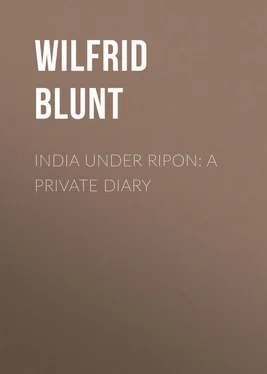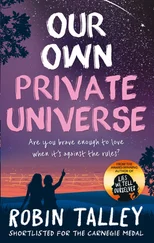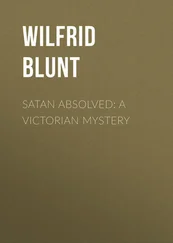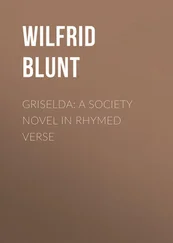Wilfrid Blunt - India Under Ripon - A Private Diary
Здесь есть возможность читать онлайн «Wilfrid Blunt - India Under Ripon - A Private Diary» — ознакомительный отрывок электронной книги совершенно бесплатно, а после прочтения отрывка купить полную версию. В некоторых случаях можно слушать аудио, скачать через торрент в формате fb2 и присутствует краткое содержание. Жанр: foreign_antique, foreign_prose, на английском языке. Описание произведения, (предисловие) а так же отзывы посетителей доступны на портале библиотеки ЛибКат.
- Название:India Under Ripon: A Private Diary
- Автор:
- Жанр:
- Год:неизвестен
- ISBN:нет данных
- Рейтинг книги:4 / 5. Голосов: 1
-
Избранное:Добавить в избранное
- Отзывы:
-
Ваша оценка:
- 80
- 1
- 2
- 3
- 4
- 5
India Under Ripon: A Private Diary: краткое содержание, описание и аннотация
Предлагаем к чтению аннотацию, описание, краткое содержание или предисловие (зависит от того, что написал сам автор книги «India Under Ripon: A Private Diary»). Если вы не нашли необходимую информацию о книге — напишите в комментариях, мы постараемся отыскать её.
India Under Ripon: A Private Diary — читать онлайн ознакомительный отрывок
Ниже представлен текст книги, разбитый по страницам. Система сохранения места последней прочитанной страницы, позволяет с удобством читать онлайн бесплатно книгу «India Under Ripon: A Private Diary», без необходимости каждый раз заново искать на чём Вы остановились. Поставьте закладку, и сможете в любой момент перейти на страницу, на которой закончили чтение.
Интервал:
Закладка:
“The country near Hyderabad is very curious, wild, uncultivated hills, trees and boulders, but beyond there is a rich plain at a lower level, bearing good crops of gholum , flax, and raghi , cotton also, I believe, but I could not distinguish the crop. The villages in this district have all the remains of fine stone walls, with round towers, each a little fortress against the raiding bands which once drew blackmail from them. The largest town, Kalbarga, seemed to have fine buildings. We travelled on through the night, and arrived early at Poona the next morning.
“ 11th Dec. – Poona is an uninteresting place, without a vestige of Eastern colour. It stands in a bare plain, feebly relieved by a river bordered with acacia trees, and some shapeless hills of trappe formation. Great macadamized roads run everywhere, and modern buildings of debased Gothic with meaningless belfries and inscriptions to Sir Bartle Frere dot the landscape. Barracks, of course, and factory chimneys abound, and institutions of all sorts. The climate, however, is a healthy one. Poona is 2,000 feet above the sea, and at one time it was proposed to remove the seat of Supreme Government here from Calcutta.
“We were taken by Miss Dillon, with whom we are staying, to see the Deccan College, an absurd building, from the tower of which we viewed the scene described. It contains a hundred and twenty boarders, all Hindus but half a dozen, only one Mohammedan. Ninety of the Hindus are Brahmins. I talked to some of the pupils in the reading rooms. They told me they read the ‘Bombay Gazette,’ which represented their views better than any other English paper, but the best native one was the ‘Hindu Prakash.’ The English Director struck us as being rather a weak vessel, contrasting unfavourably in the point of intelligence and knowledge with a learned Brahmin who explained to us the connection of Hindi, Mahratta, and Hindustani with Sanskrit. On the other hand, I noticed this learned man thumbing without ceremony palm leaf manuscripts of the eleventh century in a way which would have made a book collector’s blood run cold. In these two incidents the difference between the East and the West is exemplified.”
In the afternoon a friend of Rangiar Naidu came to see us, and gave us a number of interesting statistics as to the state of agriculture in the Bombay Presidency. It is hardly worth, however, transcribing them here, as they do not differ essentially from those we received elsewhere, and I have incorporated the result of all my agricultural inquiries omitted from my diary in the chapter on “The Agricultural Danger” given at the end of this volume.
On the 12th we went on to Bombay, where we spent a couple of days in the society principally of a Europeanized Mohammedan to whom we had brought letters, Mr. Mohammed Rogay, a wealthy man, advanced and liberal, and the head of the Moslem community. His ideas were all of the most modern type, far too modern on some points quite to please me. “He drove us through the native town, which is most picturesque and cheerful, very unlike Madras. Rogay would like it all pulled down, and built up again in rows of sham Gothic houses.” A more interesting personage was Mr. Malabari, editor of the “Indian Spectator,” a friend of Colonel Osborne’s. “He is a Parsi, but says his sympathies are rather Hindu than of his own people. He is an intelligent, active little man, going about constantly from place to place on philanthropic and political business. He confirms everything we have heard elsewhere as to the agricultural misery, and promises to take us a round of inspection on our return, as well as to get up meetings at which I can express my views, and agrees that there will be no improvement until India has gone bankrupt – bankruptcy or revolution, as Gordon suggested. 4 4 This refers to a talk I had had with General C. G. Gordon at the end of 1882 in which he had assured me emphatically that “no reform would ever be achieved in India without a Revolution.” Gordon, it will be remembered, accompanied Ripon, as his private secretary, to India in 1880, but soon after their landing at Bombay had resigned his place. The opposition of the covenanted civil service to any real reform had convinced him that he would be useless to Lord Ripon in an impossible task.
Конец ознакомительного фрагмента.
Текст предоставлен ООО «ЛитРес».
Прочитайте эту книгу целиком, купив полную легальную версию на ЛитРес.
Безопасно оплатить книгу можно банковской картой Visa, MasterCard, Maestro, со счета мобильного телефона, с платежного терминала, в салоне МТС или Связной, через PayPal, WebMoney, Яндекс.Деньги, QIWI Кошелек, бонусными картами или другим удобным Вам способом.
1
A history of Seyyid Jemal-ed-Din Afghani, the well-known leader of Liberal Panislamism will be found in my “Secret History of the Occupation of Egypt,” 1907. Mr. Sabunji had been employed by me in Egypt, and accompanied me there on the present occasion as my secretary as far as Ceylon.
2
When Robert Bourke, Lord Connemara, was sent as Governor to Madras in 1886, I recommended Ragunath Rao to him, and he gave him once more a post as Minister to one of the Native Princes.
3
Seyd Huseyn Bilgrami, now member of the Indian Council in London.
4
This refers to a talk I had had with General C. G. Gordon at the end of 1882 in which he had assured me emphatically that “no reform would ever be achieved in India without a Revolution.” Gordon, it will be remembered, accompanied Ripon, as his private secretary, to India in 1880, but soon after their landing at Bombay had resigned his place. The opposition of the covenanted civil service to any real reform had convinced him that he would be useless to Lord Ripon in an impossible task.
Интервал:
Закладка:
Похожие книги на «India Under Ripon: A Private Diary»
Представляем Вашему вниманию похожие книги на «India Under Ripon: A Private Diary» списком для выбора. Мы отобрали схожую по названию и смыслу литературу в надежде предоставить читателям больше вариантов отыскать новые, интересные, ещё непрочитанные произведения.
Обсуждение, отзывы о книге «India Under Ripon: A Private Diary» и просто собственные мнения читателей. Оставьте ваши комментарии, напишите, что Вы думаете о произведении, его смысле или главных героях. Укажите что конкретно понравилось, а что нет, и почему Вы так считаете.












